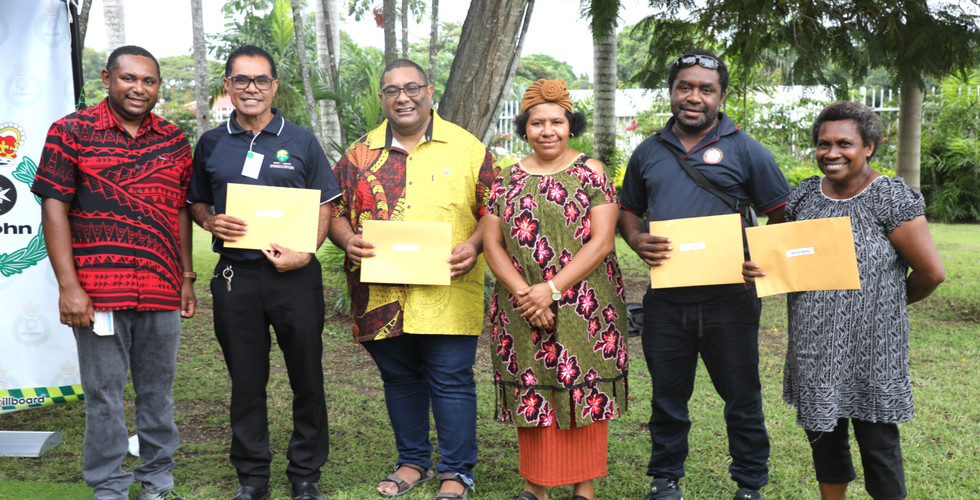PNG Basic Emergency Care Training Reaches New Milestones in Port Moresby
- mwratten3
- May 9, 2025
- 4 min read
The Regional Emergency and Critical Care Systems Strengthening Initiative (RECSI) is proud to have supported the delivery of five Basic Emergency Care (BEC) training programs at Port Moresby General Hospital in Papua New Guinea (PNG) from late March to early April 2025, including three provider and two train-the-trainer (ToT) courses.
The BEC course was developed by the World Health Organisation (WHO) in collaboration with the International Committee of the Red Cross (ICRC) and the International Federation for Emergency Medicine (IFEM). It is designed for frontline providers of emergency care in resource constrained settings and provides a safe structured approach to managing the acutely ill and injured.

The courses were led by Papua New Guinean BEC Master Trainers Dr Frederick Koha and Dr Clementine Goimba from Mendi, who were trained as BEC facilitators by the ICRC. Over 50 clinicians (comprising nurses, health extension officers, doctors, paramedics and anaesthetic technical officers) from 13 provincial health authorities took part as trainers and participants. Representatives from a number of partners and stakeholder organisations including Port Moresby General Hospital, National St John Ambulance and University of Papua New Guinea School of Medicine and Health Sciences were also involved.
As a result of the training there are seven new Master Trainers and 17 new Registered Facilitators, all of who can deliver training independently. Of the seven new Master Trainers, the highest level of accreditation, four are nurses. These are the first nurse Master Trainers in any Pacific Island Country, and have been certified to oversee the delivery of BEC courses within and beyond PNG.

To help lead and coordinate this effort, two of the new Master Trainers are the National Department of Health’s Chief of Emergency Medicine, Dr Desmond Aisi, and the Deputy Chief Dr Garry Nou, who play important roles in advancing emergency care standards in PNG, and have been strong advocates for introducing the BEC training program.
Dr Nou expressed his gratitude to the 13 Provincial Health Authorities who supported their staff to attend the training program noting that their “commitment will exponentially boost our national capacity to deliver quality emergency care, especially in rural and underserved areas.”

Other emergency care leaders spoke to the value of the course in reinforcing essential basic skills to manage life-threatening conditions. The ability to deliver safe, timely and effective emergency care is essential to achieving the Sustainable Development Goals (SDGs) and ensuring universal health coverage.

“As a physician, the BEC course has helped bring me back to the most basic and fundamental way of approaching patients” said Dr June Rea, an emergency physician from Gerehu General Hospital. “It has also bridged communication gaps at all levels of healthcare workers involved in emergency care, enabling a common language that we can all use and understand in patient handover and continuity of care.”

The BEC course also prioritises the inclusion of nurse leaders and emergency nursing staff who deliver frontline services to communities. Sister Elizabeth Mungor, an emergency nurse from Wewak, reiterated that the course reinforced key skills and approaches required at all levels of health facilities that are essential to the continuity of care from clinics to hospitals. “This BEC course, it has given me a new insight” she said. “I believe that, in the near future, this will be the most taught and learnt skills...right to the health providers in the rural or remote locations.”

Based on input and guidance from clinicians in PNG and the wider Pacific region, RECSI is working to support the delivery and roll-out of BEC training in a way that is contextualised and best suited to local workforce needs. Two of the BEC provider courses were delivered as two-day hybrid courses. These were the first BEC hybrid provider courses ever delivered in PNG. This mode of learning allows participants who have already completed a series of online training modules to undertake a shorter two-day face-to-face training as an alternative to the five-day classic course. The updated approach represents a more flexible model of learning, and means health workers undertaking the training require less time away from their clinical duties.

Clinical educator and flight nurse for National St John Ambulance Idana Enai expressed the benefits of this new approach. “Beginning as a hybrid learner allowed me the flexibility to balance my professional responsibilities while engaging with WHO Academy Basic Emergency Care Online content at my own pace” she said. “This format helped build a solid theoretical foundation before transitioning into the face to face components”.
More BEC courses are planned to be delivered under the RECSI program in Mt Hagen and Kokopo (later in 2025). In the meantime, health workers trained through the initial series of courses in Port Moresby will be implementing the training within their own healthcare facilities across PNG, contributing to the WHO’s 25 x 25 Emergency Care Saves Lives campaign, which was launched by the WHO Chief Nursing Officer in 2023.
RECSI is supported by the Australian Government through the Partnerships for a Healthy Region Initiative. Delivery of this training was facilitated by National St John Ambulance PNG (as RECSI’s implementing partner for PNG) in collaboration with the Australasian College for Emergency Medicine. RECSI is grateful to Port Moresby General Hospital for their crucial role in hosting this training and their ongoing support.



















Comments